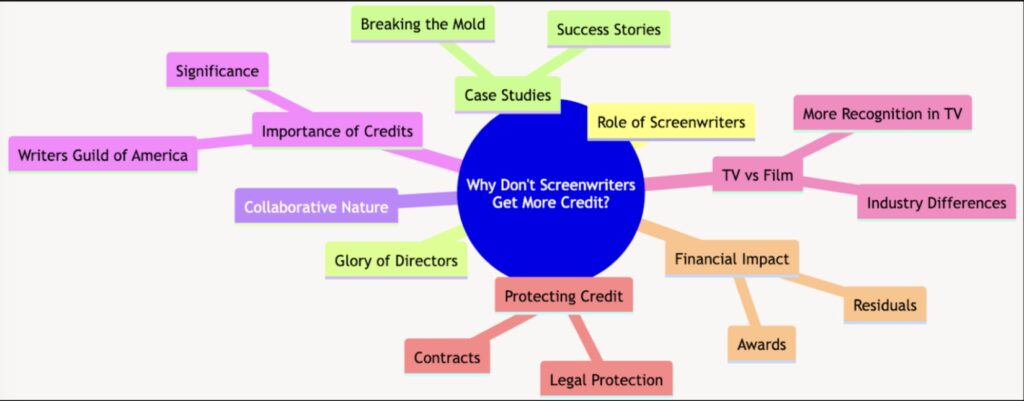Screenwriters are often the unsung heroes of the film and television industry. They craft the stories that captivate audiences, yet their names often go unnoticed, overshadowed by directors and actors.
This article delves into the various factors contributing to this lack of recognition, from industry norms to the collaborative nature of filmmaking.
Key Takeaways
- Screenwriters play a pivotal role in shaping a film or TV show but often remain behind the scenes.
- Directors and actors usually receive more public recognition due to industry norms and public perception.
- The collaborative nature of filmmaking complicates the attribution of credit.
- The Writers Guild of America is crucial in ensuring fair credit distribution.
- Screenwriters can take legal steps to protect their credits, especially in contracts.
- The 2023 WGA Strike has resulted in a contract protecting screenwriters and could lead to better credit for writers.

The Role of a Screenwriter in Filmmaking
Crafting the Story
Screenwriters are the masterminds behind the plot, characters, dialogue, and pacing of a film or TV show. They weave together these elements to create a compelling narrative that engages the audience.
Crafting the story is a meticulous process that involves extensive research, brainstorming, and multiple revisions. The screenwriter must consider not only the storyline but also the emotional arcs of the characters, the tone of the dialogue, and the overall pacing of the script.
Setting the Stage
In addition to crafting the story, screenwriters also set the stage where the narrative unfolds.
This involves creating a detailed blueprint that guides directors, actors, and other crew members in bringing the story to life.
Setting the stage is about creating an atmosphere that enhances the narrative. Whether it’s the eerie setting of a horror film or the bustling backdrop of a romantic comedy, the environment plays a crucial role in how the story is perceived.
The screenwriter provides the initial vision, outlining everything from camera angles to lighting, giving the director and the production team a comprehensive guide to follow.
The Glory of Directors
Directors are often the face of a film or TV show, receiving the lion’s share of public and industry recognition. This is due to:
- Public Perception: Directors are seen as the visionaries who bring a story to life and often become household names.
- Industry Norms: Awards and accolades are usually directed towards directors, reinforcing their public image.
The Collaborative Nature of Filmmaking
Filmmaking is a team effort involving various departments, such as direction, production, cinematography, and more. This collaborative nature often blurs the lines of individual contributions, making it challenging to attribute credit accurately.
Team Effort: Multiple people contribute to the final product, from the initial concept to the last edit.
Affects Credits: The collaborative process can dilute individual contributions – complicating the attribution of screenwriting credits.
Importance of Screenwriting Credits
Receiving a “Screenplay By” credit is not just a matter of pride but also has financial implications.
The Writers Guild of America (WGA) plays a significant role in this:
- Writers Guild of America: The WGA ensures that credits are distributed fairly and that writers receive appropriate residuals.
- Significance of Credits: Proper credit can lead to more work, higher pay, and even awards, making it a crucial aspect of a screenwriter’s career.
Table 1: Importance of Different Types of Credits

Why TV is Different
In the television industry, screenwriters often find themselves in a more favorable position than film.
The critical difference lies in the role of the showrunner, who is usually an experienced writer with significant creative control. This role allows them to influence not just the script but the entire production, from casting to editing.
As a result, the showrunner often gains more public recognition, contrasting sharply with the film industry, where directors are the ones in the limelight.
Television also has its own set of industry practices that benefit writers.
For instance, TV shows are typically collaborative efforts involving a writers’ room, where multiple talents contribute to different episodes. This not only allows for a diversity of ideas but also makes it easier to attribute credit.
Furthermore, the financial structure in television is more favorable to writers – offering them residuals for reruns and international sales – thereby providing a more stable income.
How to Protect Your Screenwriting Credit
The importance of safeguarding your screenwriting credit extends beyond personal pride; it has tangible financial and professional implications.
The cornerstone of this protection is a well-crafted contract.
Before putting pen to paper, ensure that you have a legally binding agreement that clearly outlines how credit will be attributed and what financial benefits you are entitled to.
However, a contract is not the end-all solution. It’s equally important to maintain a detailed record of your work. This includes drafts, revisions, and even email correspondence related to the project. Such documentation can be invaluable in resolving any future disputes over credit attribution.
Steps to Safeguard Your Screenwriting Credit
- Legal Consultation: Before signing any contract, consult with an entertainment attorney to ensure your rights are adequately protected.
- Understand the Contract: Familiarize yourself with all clauses, especially those related to credit and financial compensation.
- Keep Records: Document all stages of your work, from initial drafts to final revisions, as this can serve as evidence in any credit disputes.
The Financial Impact of Screenwriting Credits
The type of credit a screenwriter receives isn’t just a matter of ego; it has a direct bearing on their financial well-being and future career prospects.
For instance, a “Screenplay By” credit often comes with residuals, which are ongoing payments made to reuse content. These residuals can be a significant income source, especially if the film or TV show enjoys long-term success or international syndication.
Awards also play a crucial role. Being nominated for or winning an award like an Oscar or an Emmy can dramatically boost a screenwriter’s market value. It opens doors to more prestigious projects and often comes with financial bonuses.
However, the eligibility for such awards is often tied to the type of credit received, making it even more critical to secure the right kind of credit for your work.
- Residuals: These are ongoing payments made to screenwriters for the reuse of their content. Whether it’s reruns on television, streaming platforms, or international syndication, residuals can provide a stable income long after the initial release.
- Awards: Winning or even being nominated for prestigious awards like Oscars or Emmys can significantly boost a screenwriter’s market value. Awards bring recognition, often come with financial bonuses, and open doors to more lucrative projects.
2023 WGA Contract Agreement and Its Impact on Screenwriter Credit
The Writers Guild of America (WGA) recently negotiated a new contract in 2023 that brings significant changes to the industry, particularly for screenwriters. This contract was won after a 148-day strike and aims to address critical issues affecting writers, such as pay and working conditions.
Key Changes Relevant to Screenwriters
- Guaranteed 2nd Step: If a screenwriter is hired for a screenplay for 200% of the minimum or less, a second step is now required. This also applies to screenplay purchases.
- Weekly Pay: An accelerated payment schedule has been introduced. If a writer is paid 200% of the minimum or less, they will receive 50% pay upon commencement, 25% pay nine weeks after commencement upon invoice, and the remaining 25% on delivery.
- Streaming Features: For made-for-HBSVOD programs with a budget of $30 million or more, there is an 18% increase to initial compensation and a 26% increase in the residual base.
- Artificial Intelligence: The use of AI in MBA-covered projects is regulated. AI-generated written material is not considered literary material, and companies must disclose if any material given to a writer has been generated by AI.
This new contract offers more financial security and creative control for screenwriters, potentially leading to better recognition and credit in the industry. (1)
Case Studies: Screenwriters Who Broke the Mold
Breaking through the traditional barriers of the film and TV industry is no small feat. However, some screenwriters have managed to do just that, leveraging their credits to gain industry-wide recognition and open doors to new opportunities.
Diablo Cody
Diablo Cody skyrocketed to fame with her Academy Award-winning screenplay for “Juno.” This recognition wasn’t just a one-time event; she used it as a springboard to diversify her career. Cody transitioned into other roles within the industry, including directing and producing, thereby solidifying her name as a multi-talented force in Hollywood.
Aaron Sorkin
Aaron Sorkin is a writer and director known for his intricate dialogue and compelling storylines. His work on projects like “The West Wing” and “The Social Network” has made him a household name. Sorkin’s ability to excel in multiple roles has set a precedent for aspiring screenwriters.
Shonda Rhimes
Shonda Rhimes, the mastermind behind hits like “Grey’s Anatomy” and “Scandal,” has redefined what it means to be a successful screenwriter in television. Not only has she received numerous writing credits, but she has also moved into the role of executive producer and even launched her own production company, Shondaland.
Charlie Kaufman
Charlie Kaufman gained widespread recognition for his unconventional storytelling techniques in films like “Being John Malkovich” and “Eternal Sunshine of the Spotless Mind.” His unique approach to screenwriting has not only earned him critical acclaim but also several screenwriting awards, making him one of the most distinctive voices in modern cinema.
Steps to Gain Industry Recognition
Gaining recognition in the highly competitive film and TV industry requires a multi-faceted approach. Here are some key steps to help you stand out:
1. Build a Portfolio
A well-crafted portfolio is your calling card in the industry. It should showcase a range of your best work, from short scripts to full-length screenplays. The quality of your portfolio can make or break your chances of getting noticed by agents, producers, and other industry professionals.
2. Network
Networking is often cited as one of the most crucial aspects of building a successful career in any field, and screenwriting is no exception. Attend industry events, join screenwriting groups, and don’t hesitate to contact professionals in the field. A strong network can provide invaluable opportunities and insights you wouldn’t have access to otherwise.
3. Seek Mentorship
The complexities of the screenwriting industry can be daunting for newcomers. Seeking mentorship from someone who has successfully navigated these challenges can provide you with a roadmap for your career. A mentor can offer personalized advice, introduce you to key contacts, and even help you refine your craft.
4. Enter Competitions
Screenwriting competitions offer a platform to showcase your talent and get your work in front of industry professionals. Winning or even just placing in these competitions can significantly boost your profile and open doors to new opportunities.
5. Stay Updated and Adapt
The film and TV industry is ever-changing, with new formats and platforms emerging regularly. Keeping yourself updated on industry trends and being willing to adapt your skills can make you more marketable as a screenwriter.
Conclusion
The need for recognition for screenwriters in the film industry is a multifaceted issue, influenced by industry norms, the collaborative nature of filmmaking, and public perception. While strides are being made, especially in television, much work remains. Screenwriters must be proactive in protecting their credits and seeking the recognition they rightfully deserve.

